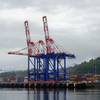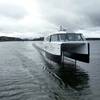Caribbean Ship Inspector Training course Held
Performing a vessel inspection is an important task. Inspections by flag and port States are key to keeping ship standards high and in turn reducing accidents and pollution to the maritime environment.
To maintain a high level of safety in the region, a Regional Caribbean Ship Inspector Training course (CASIT) (29 October – 16 November) has been held in Trinidad and Tobago, said a press release from International Maritime Organization (IMO).
The objective of the course is to prepare ship surveyors to be able to work in a Caribbean maritime administration. On completion, trainees will be able to carry out flag State inspection (FSI) on all vessels under 24 meters in length and conduct annual and renewal surveys on vessels up to 500 GT.
Participants will also have been trained to carry out port State control (PSC) inspections, including inspection of documents on all ships.
The course covers a range of theoretical topics too, such as international treaties compliance, port and flag State regimes, Recognized Organizations (ROs), conventions on maritime safety and pollution prevention and the regional safety codes. It also includes technical components ranging from ship stability and loadlines to dangerous cargoes, machinery installations and hull constructions.
In addition, students are trained on matters related to working and living conditions on board ships in accordance with the International Labour Organization (ILO) Maritime Labour Convention 2006.
The course also gave participants a chance to conduct actual ship inspections and get a real feel for the job.
As part of IMO's Women in Maritime programme, one fellowship was awarded to a member of WiMAC, a regional association established by IMO to promote Caribbean women in maritime. The course was facilitated by IMO.
40 participants from 13 Member States and 4 Territories attended the course.











